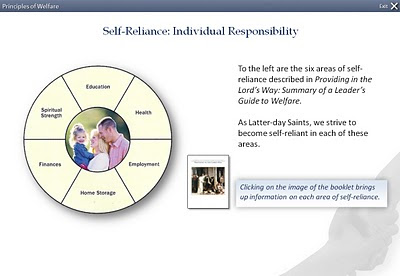A few years ago, a very good Christian couple, both inspiring servants of Christ in many ways, expressed concern to me about the LDS approach to food storage and emergency preparedness. The were firm believers in the concept of the Rapture and believed that when times got really tough, the Lord would be taking them and other good Christians away. They saw the food storage program of the Church as an expression of lack of faith in Christ. I tried responding by explaining that God has often commanded his people to prepare for difficult times--Joseph and the seven years of plenty as a time to prepare for famine, Noah and the ark preparing for flood, etc.--and that preparing for the future in respond to God's commands is an expression of faith, not lack of it. I also explained it's not just focused on end times, but that such preparations have helped our people in numerous events and circumstances already, from hurricanes to unemployment. It's just a wise, even inspired, thing to do. That helped little, but didn't remove their fundamental concerns.
Those peering into the Church can easily get the wrong impression. For example,, tThis morning to help me learn a little more about some of my duties in the Stake High Council, I began reviewing some of the wonderful resources the Church has online for members and leaders. There is a page on "Welfare Lessons for Church Leaders" at the Church's resource-rich Provident Living site (providentliving.org) that has the presentation, "Principles of Welfare" (sadly, though it is a PowerPoint presentation, it is only available an executable file that one has to install, apparently to make sure that all the video content in it plays properly). One of the slides is shown below. The title is "Individual Responsibility," a term one can hear frequently in LDS circles. I can imagine how an outsider would look at that and say, "What about faith in Christ? What about trusting in Christ, not our works?" There is a risk of that kind of response, but it misses some important points. The Lord has always urged his people to prepare in various ways. It's a common term in the divine lexicon. Consider the parable of the faithful steward in Luke 12:42-48, where the steward needed to "prepare" and be ready for the Lord's coming. Consider the parable of the ten virgins in Matthew 25, who needed to be ready with oil in their lamps. The most important preparation may be spiritual, but there are also times when the challenges will be temporal. The early Church was concerned about the physical as well as spiritual welfare of its members, working for the temporal relief of widows, orphans, and the needy, and sharing their goods for the common welfare of the Church.
Today, in a time of increasing tribulation and calamity, the Lord has kindly given us instruction that we should prepare. Getting out of debt, having food and water ready to handle an emergency or to better withstand economic turmoil, and being prepared with education, physical health, financial savings and discipline, elimination of addictions and other bad habits, is part of His plan to bless us and help us be more able to serve Him and bless others in these critical times. Such actions and attitudes do not run contrary to faith in Christ, but exemplify faith in Him and trust in His guidance to us. These are the kind of works without which faith may indeed die: there's a reason why the Bible says "faith without works is dead."
Faith in Christ calls for personal responsibility for our stewardship. We must be wise stewards, preparing now and seeking to do what the Lord has commanded us, that we may be ready when he returns. May we each personally prepare for the challenges ahead and not expect to find security and comfort in ease, much less quantitative easing (oh, did I mention the dollar must eventually tank with the thieving fiscal policies being perpetrated by Fed and company?). There are hurricanes ahead, and we're probably not going to miraculously delivered by ignoring the warnings and refusing to prepare. Faith leads to action, the kind of action the Church urges us to take to advance the welfare of our families and those around us, in addition to (or even as part of) spiritual preparation.
Continue reading at the original source →
Show all posts from
Go to Previous
Shortcut Keys: K or P
Shortcut Keys: K or P
Go to Next
Shortcut Key: J or N
Shortcut Key: J or N
Close
Shortcut Key: Esc
Shortcut Key: Esc
Blogs about Latter-day Saint Topics
Blogs by Mormons on Other Topics
Blogs by Full-Time Mormon Missionaries
Content from Official Church Feeds
Audio and Video from
General Conferences
General Conferences




